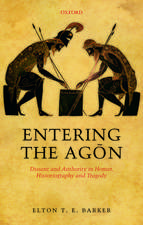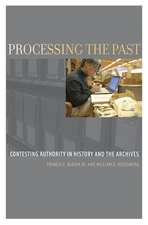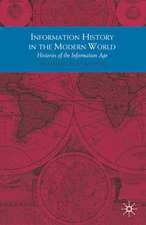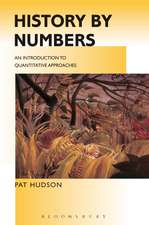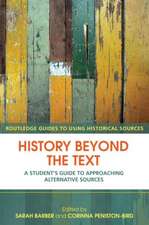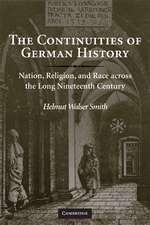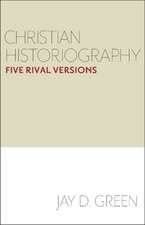Key Issues in Historical Theory
Autor Herman Paulen Limba Engleză Hardback – 19 mar 2015
Over 11 thematically-based chapters, Herman Paul discusses subjects such as:
- history, memory and trauma
- historical experience and narrative
- moral and political dimensions of history
- historical reasoning and explanation
- truth, plausibility and objectivity.
With textboxes providing additional focus on a range of key topics, this is an attractive, accessible and up-to-date guide to the field of historical theory.
| Toate formatele și edițiile | Preț | Express |
|---|---|---|
| Paperback (1) | 294.24 lei 3-5 săpt. | +15.02 lei 4-10 zile |
| Taylor & Francis – 16 mar 2015 | 294.24 lei 3-5 săpt. | +15.02 lei 4-10 zile |
| Hardback (1) | 998.71 lei 6-8 săpt. | |
| Taylor & Francis – 19 mar 2015 | 998.71 lei 6-8 săpt. |
Preț: 998.71 lei
Preț vechi: 1217.94 lei
-18% Nou
Puncte Express: 1498
Preț estimativ în valută:
191.16€ • 207.72$ • 160.68£
191.16€ • 207.72$ • 160.68£
Carte tipărită la comandă
Livrare economică 21 aprilie-05 mai
Preluare comenzi: 021 569.72.76
Specificații
ISBN-13: 9781138802728
ISBN-10: 1138802727
Pagini: 176
Dimensiuni: 156 x 234 x 15 mm
Greutate: 0.41 kg
Ediția:1
Editura: Taylor & Francis
Colecția Routledge
Locul publicării:Oxford, United Kingdom
ISBN-10: 1138802727
Pagini: 176
Dimensiuni: 156 x 234 x 15 mm
Greutate: 0.41 kg
Ediția:1
Editura: Taylor & Francis
Colecția Routledge
Locul publicării:Oxford, United Kingdom
Public țintă
UndergraduateCuprins
List of tables. Preface. Acknowledgments. 1.What is historical theory? 2. What is the past? 3. Relations with the past 4. The material relation: rooted in the past 5. The aesthetic relation: historical narratives 6. The political relation: making history .7 The epistemic relation (i): historical hypotheses 8. The epistemic relation (ii): historical explanations 9. The epistemic relation (iii): truth and plausibility. 10 The moral relation: lessons from the past 11. Relations management: the ethics of historical scholarship Index.
Notă biografică
Herman Paul is Associate Professor of Historical Theory and Historiography at Leiden University, where he directs a research project on ‘The Scholarly Self: Character, Habit, and Virtue in the Humanities, 1860-1930’. His publications include Hayden White: The Historical Imagination (Polity Press, 2011).
Recenzii
"This is currently the best introduction to historical theory available in English – comprehensive, lucid and dealing in original and innovative ways with a range of key problems in the philosophy of history and historical theory. It should be read by any undergraduate studying history and will be read with great benefit by many Masters and PhD students as well as professional historians interested in historical theory. The way Herman Paul combines the problematisation of what the past is with explorations into the political, aesthetic, epistemic, and moral dimensions of historical writing is utterly convincing."
Stefan Berger, Ruhr University Bochum, Germany
"Key Issues in Historical Theory is one of the most absorbing and accessible history theory books that I have read recently. Paul has written a thoughtful and intelligent work about how we think about, write and read history. One of the strengths of the work, apart from its readability, is the use he makes of interesting examples to illustrate his theoretical argument, thus clearly demonstrating the relevance of theoretical reflection for historians."
Claire Norton, St Mary's University, Twickenham, United Kingdom
"This is currently the best introduction to historical theory available in English – comprehensive, lucid and dealing in original and innovative ways with a range of key problems in the philosophy of history and historical theory. It should be read by any undergraduate studying history and will be read with great benefit by many Masters and PhD students as well as professional historians interested in historical theory. The way Herman Paul combines the problematisation of what the past is with explorations into the political, aesthetic, epistemic, and moral dimensions of historical writing is utterly convincing."
Stefan Berger, Ruhr University Bochum, Germany
"Key Issues in Historical Theory is one of the most absorbing and accessible history theory books that I have read recently. Paul has written a thoughtful and intelligent work about how we think about, write and read history. One of the strengths of the work, apart from its readability, is the use he makes of interesting examples to illustrate his theoretical argument, thus clearly demonstrating the relevance of theoretical reflection for historians."
Claire Norton, St Mary's University, Twickenham, United Kingdom
"Describing his book as 'an attractive, accessible and up-to-date guide to the field of historical theory,' Paul offers much more than an analysis of major historiographical works and ideas. His book, translated from the Dutch and introducing the ideas and processes of doing history, also introduces practical insights and the use of theories by and for historians, non-historians, and academics in general...Summing Up: Highly recommended. All levels/libraries."
K. Lynass, University of Maryland University College, CHOICE Review
Stefan Berger, Ruhr University Bochum, Germany
"Key Issues in Historical Theory is one of the most absorbing and accessible history theory books that I have read recently. Paul has written a thoughtful and intelligent work about how we think about, write and read history. One of the strengths of the work, apart from its readability, is the use he makes of interesting examples to illustrate his theoretical argument, thus clearly demonstrating the relevance of theoretical reflection for historians."
Claire Norton, St Mary's University, Twickenham, United Kingdom
"This is currently the best introduction to historical theory available in English – comprehensive, lucid and dealing in original and innovative ways with a range of key problems in the philosophy of history and historical theory. It should be read by any undergraduate studying history and will be read with great benefit by many Masters and PhD students as well as professional historians interested in historical theory. The way Herman Paul combines the problematisation of what the past is with explorations into the political, aesthetic, epistemic, and moral dimensions of historical writing is utterly convincing."
Stefan Berger, Ruhr University Bochum, Germany
"Key Issues in Historical Theory is one of the most absorbing and accessible history theory books that I have read recently. Paul has written a thoughtful and intelligent work about how we think about, write and read history. One of the strengths of the work, apart from its readability, is the use he makes of interesting examples to illustrate his theoretical argument, thus clearly demonstrating the relevance of theoretical reflection for historians."
Claire Norton, St Mary's University, Twickenham, United Kingdom
"Describing his book as 'an attractive, accessible and up-to-date guide to the field of historical theory,' Paul offers much more than an analysis of major historiographical works and ideas. His book, translated from the Dutch and introducing the ideas and processes of doing history, also introduces practical insights and the use of theories by and for historians, non-historians, and academics in general...Summing Up: Highly recommended. All levels/libraries."
K. Lynass, University of Maryland University College, CHOICE Review
Descriere
Key Issues in Historical Theory is a fresh, clear and well-grounded introduction to this vibrant field of inquiry, incorporating many examples from novels, paintings, music, and political debates. The book expertly engages the reader in discussions of what history is, how people relate to the past and how they are formed by the past.
The book convincingly shows that historical theory is not limited to reflection on professional historical studies, but offers valuable tools for understanding autobiographical writing, cultural heritage and political controversies about the past. With textboxes providing additional focus on a range of key topics, this is an attractive, accessible and up-to-date guide to the field of historical theory.
The book convincingly shows that historical theory is not limited to reflection on professional historical studies, but offers valuable tools for understanding autobiographical writing, cultural heritage and political controversies about the past. With textboxes providing additional focus on a range of key topics, this is an attractive, accessible and up-to-date guide to the field of historical theory.


